QuestionWe have had 2 female rats for 2 years and have just had to separate them due to aggressive fighting. Up until a month or so ago they would have the occasional squabble but it has turned into something far more serious with the smaller female being bitten severely around her neck and back. There were puncture wounds, some quite deep so I felt I had no choice but to separate them. They do spend time together (supervised) outside of their cages and no fighting occurs then but I am doubtful that they can live together any longer. Would you have any idea of what would cause such behaviour?
A second question or curiosity is that we also had 2 males, all from the same litter as the above mentioned females. Unfortunately the largest male passed away unexpectedly in August making him 21 months old. He did not display any signs of illness, was eating, playing, sleeping as normal & no obvious signs of a tumour. He was a very large rat in comparison to his brother who incidentally was the runt of the litter and still going strong, but also much larger than his sisters which I know is typically the case but he really was MUCH larger. They are black and white as was he, but by the time he reached 3-4 months he had completely changed colouring, turning silvery grey with a white/creamy underbelly. He was beautiful, a little timid but so sweet so it was very sad when he passed. I have never thought that his colouring or size is linked to his early death but not being an expert, thought it best to provide you with any diversities that may or may not be associated with his premature death. I have read that obesity is a killer in rats, but to be honest I would not have called him overweight. He seemed proportionate and was active although less so than his brother but that had been the case from the moment that we got them.
All of our rats were bought at a local & reputable pet store and not from a breeder. Does this make a difference as far as longevity, health & personality issues are concerned?
Any help/advice you can give regarding the mischievous females (Gracie & Lil) or the sad passing of Persia our great male, would be much appreciated.
AnswerHi Angie
I think I can help shed a bit of light on a few things for you. Lets start with the "Ladie's"! For starters, this is going to pertain to intact females and I will assume your girls are intact since I did not see any mention that they are spayed.
Menopause starts in females anywhere from 18 months to 2 years old and causes some strong surges of estrogen. With it, unfortunately, comes the development of mammary tumors that involve many female rats, and also personality changes are not uncommon as well. Typically, the female is grumpy just like a human woman would be during menopause. This could very well be what has occurred with your girl now. She may adjust on her own as her body learns to regulate the changes in hormone levels, but there is a drug that can be used called lupron. It is a hormone that helps decrease estrogen levels and is used by injection once per month. It is used for ferrets with adrenal disease and also has had great success in female rats with mammary tumors by slowing down the growth of tumors already established. I have used it on my females and the treatment was a success.
It may be a bit of a headache to have to maintain another cage, but it is the best option right now to keep the girls apart. Allowing them play time together is a good idea and should keep them from being depressed about being apart. Keep an eye out for that too, but something tells me that the ladies are cranky and have made up their minds they would prefer their own space and do not want to share it with each other. Again, as long as they seem adjusted, are eating and do not appear depressed like they miss each other, it is for the best at this stage. In a few months you can try to put them back together again to see how it goes or of course if you discuss using hormone treatment with your vet and go that route, they may be put together sooner.
As for your male, its very hard to determine what causes sudden death in a seemingly healthy rat. Obviously something was going on inside that you were not aware of. It could have been a number of things. Heart attack is the number one killer in male rats that are "chubby". I have had the very unpleasant experience of watching one of my most beloved males, Peanut (pictured in the photos of me on my profile) who, at 18 months, died before my eyes after being out for play time. I put him in the cage, turned my back, heard this odd noise coming from one of the cages, not thinking it was a rat sound, I went toward my rabbits cage when my son said "MOM!! Peanut is dead!!" I ran to his cage, pulled him out and he was already limp,tongue out, eyes wide open.
I don't even recall crying. I was in shock. Other than a case of bumble foot (common in over weight rats too!) he was probably one of my most healthy rats, never even having a sniffle in his life. I carried his lifeless body in a blanket for two hours while my family, horrified thinking I had lost my mind temporarily, walked around the house with my beloved deceased rat, talking to him, even rocking him in the rocking chair. Finally my husband coaxed me to hand him over so he can put him in the little box and I refused saying that once I let him go, this would be the last time I would ever see him or touch him. It was that point I think I lost it and cried for two days. A necropsy was done and sure enough, as I had suspected, Peanut died from cardiac arrest. He was just too fat, and that is that.
Another cause of sudden death is often an aneurysm which is also fairly common. I have seen it alot at the clinic and also sadly, with my own rat as well too. The list can go on and on, anywhere from heart attack, brain aneurysm or pulmonary embolism to stroke. I have seen a rat have a heart attack due to an infection in his heart that damaged his valves and he never showed one sign of illness. Basically, the only way to know what claimed your precious rats life is to have a necropsy done and to do that of course, the rat needs to be kept cold in the refrigerator (not frozen) and taken to the vet usually within 24 hours of death.
Most vets do not charge for this unless they cannot find the cause themselves and need to send tissue samples out to pathology. The cost usually is right around $100 or a bit over. I don't often have it done but for something acute like that I do, or if I am worried what may have killed my rat is contagious, we go for the necropsy too, but believe it or not, not many illness are as contagious as we think among rats with the exception of SDA and Sendai viruses and a few other nasty illnesses.
You asked if a breeder is better than a pet store rat as for as longevity, health and personality go and the answer is:
Absolutely.
There is a gigantic difference between a breeder from a pet store (the commercial breeder or breeder mill) and a hobby breeder that is also usually a rat owner as well.
There are very reputable breeders that I know of personally. What a good breeder should always do is know the history of the rats they are breeding, never breed the female more than twice, and always making sure that for example, if they have a litter of rats that has shown aggression or cancerous tumors etc...they retire the parents and never breed them again. Also, a good breeder will make sure they socialize the rats and this begins the moment they are born. Rat pups should be touched and held when they are newborns. This assures the the rat is socialized, not afraid of humans and this makes for a very loving rat with an awesome personalty.
The problem with petstores is this: If the petstore sells feeder rats, chances are the rats you are buying that are labeled as PETS are nothing more than feeder rats that were more "unusual" looking the ordinary white rat. They pull out rats with unusual markings and colorings or with dumbo ears etc....and if the pet store does sell rats that are not feed stock, chances are they are still not bred as well as they would be from the hobby breeder. They are commercial breeders that are in it for the MONEY only and breed back to back, putting out up to 100 rats at a time. There is no way that this type of breeder can take time to socialize that many rats. They are also not bred for health nor temperament. This is why you get only a 14 day return policy at pet stores. So again, if you truly want a sweet rat that is going to be more healthy and socialized, a hobby breeder is the best route to take. I can find a list of good breeders if you want and also, if you do not have a vet that is really well versed on rats, such as an exotic vet, I can also help locate one for you in your area if needed.
Hope this helps! Feel free to contact me any time you need any advice. I will do my best to help!!
Regards
Sandy

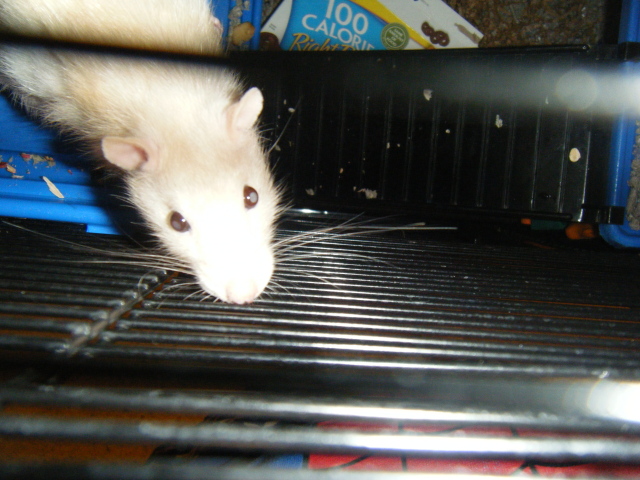 layla is acting insane
Question
Laylas eye
Hi, my rat Layla is about 3 years o
layla is acting insane
Question
Laylas eye
Hi, my rat Layla is about 3 years o
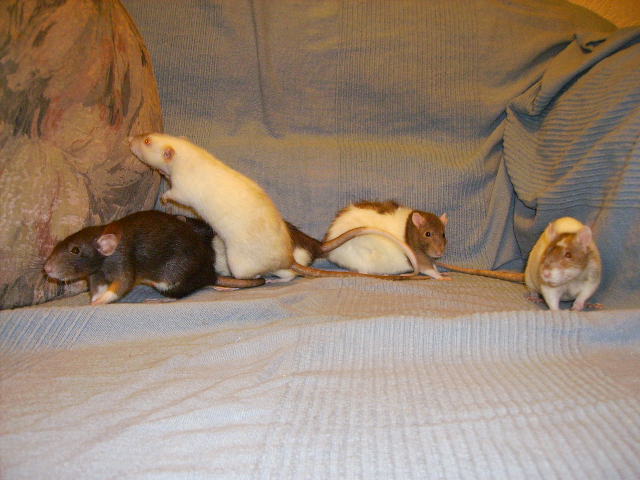 What is a
QuestionQUESTION: I went to a PETCO near me to look at
What is a
QuestionQUESTION: I went to a PETCO near me to look at
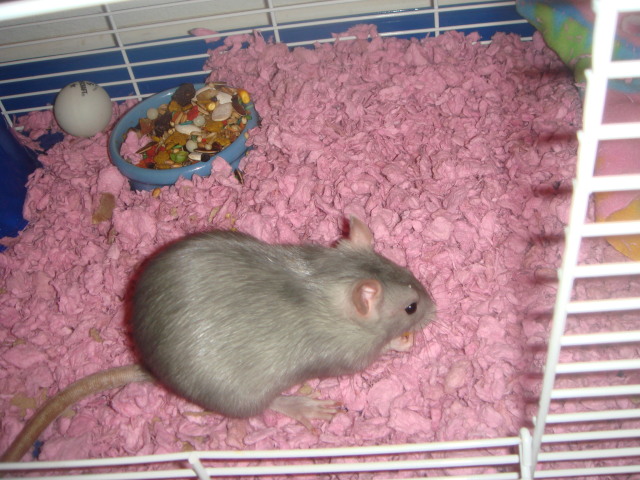 My Rat Templetons Health.
Question
My little girl.
My rat has always had a sneeze
My Rat Templetons Health.
Question
My little girl.
My rat has always had a sneeze
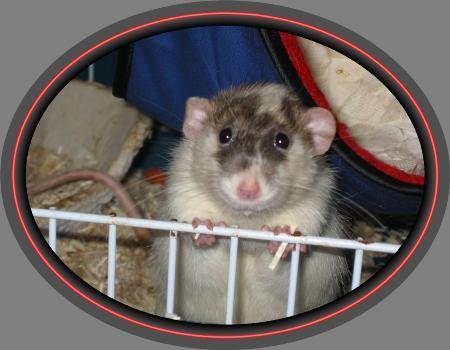 Oxygen...how much do I give her?
QuestionQUESTION: Hi there. My rat Blondie is 2 years a
Oxygen...how much do I give her?
QuestionQUESTION: Hi there. My rat Blondie is 2 years a
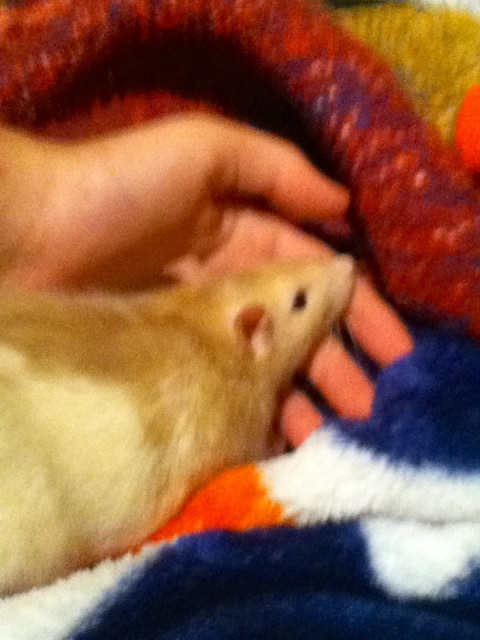 Scared, neglected rat needs a friend
QuestionDustin
Dustin
QUESTION: Dear Nata
Scared, neglected rat needs a friend
QuestionDustin
Dustin
QUESTION: Dear Nata